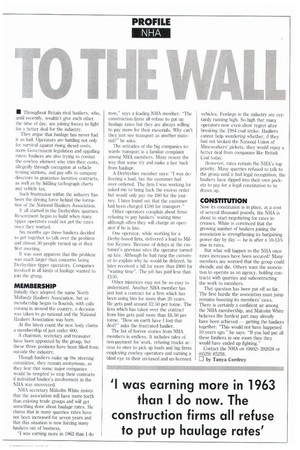Throughout Britain rival hauliers, who, until recently, wouldn't give each
Page 85

If you've noticed an error in this article please click here to report it so we can fix it.
other the time of day, are joining forces to fight for a better deal for the industry.
They argue that haulage has never had it so bad. Operators are battling not only for survival against rising diesel costs, more Government legislation and appalling rates: hauliers are also trying to combat the cowboy element who trim their costs, allegedly through corruption at vehicle testing stations, and pay-offs to company directors to guarantee lucrative contracts, as well as by fiddling tachograph charts and vehicle tax.
Such frustration within the industry has been the driving force behind the formation of the National Hauliers Association.
It all started in the Derbyshire quarries. Resentment began to build when many tipper operators could not get the rates rises they wanted.
Six months ago three hauliers decided to get together to talk over the problem and almost 30 people turned up at their first meeting.
It was soon apparent that the problem was much larger than concerns facing Derbyshire tipper operators. Companies involved in all kinds of haulage wanted to join the group.
MEMBERSHIP
Initially they adopted the name North Midlands Hauliers Association, but as membership began to flourish, with calls coming in around the country, a decision was taken to go national and the National Hauliers Association was born.
At the latest count the new body claims a membership of just under 600.
A chairman, secretary and treasurer have been appointed by the group, but these three positions have been filled from outside the industry.
Though hauliers make up the steering committee, they remain anonymous, as they fear that some major companies would be tempted to stop their contracts if individual haulier's involvement in the NHA was uncovered.
NHA secretary Malcolm White insists that the association will have more teeth than existing trade groups and will get something done about haulage rates. He claims that in many quarries rates have not been increased for seven years and that this situation is now forcing many hauliers out of business.
"I was earning more in 1963 than I do now," says a leading NHA member. "'Ile construction firms all refuse to put up haulage rates but they are always willing to pay more for their materials. Why can't they just see transport as another material?" he asks.
'['he attitudes of the big companies towards transport is a familiar complaint among NIIA members. Many resent the way that some try and make a fast buck from haulage.
A Derbyshire member says: "I was delivering a load, but the customer had over-ordered. The firm I was working for asked me to bring back the excess order but would only pay me £80 for the journey. I later found out that the customer had been charged £180 for transport."
Other operators complain about firms refusing to pay hauliers' waiting time although often they will charge an operator if he is late.
One operator, while working for a Derby-based firm, delivered a load to Milton Keynes. Because of delays at the customer's previous sites the operator turned up late. Although he had rung the customer to explain why he would be delayed, he later received a bill for more than £800 for "waiting time". The job has paid less than £150.
Other injustices may not be so easy to understand. Another NHA member has just lost a contract for a firm which has been using him for more than 20 years. He gets paid around £2.50 per tonne. The firm which has taken over the contract from him gets paid more than £6.50 per tonne. "How on earth have I lost that deal?" asks the frustrated haulier.
The list of horror stories from NHA members is endless. It includes tales of non-payment for work, refusing trucks access to sites to pick up loads and big firms employing cowboy operators and turning a blind eye to their un-taxed and un-licensed
vehicles. Feelings in the industry are certainly running high. So high that many operators now even show regret after breaking the 1984 coal strike. Hauliers cannot help wondering whether, if they had not broken the National Union of Mineworkers' pickets, they would enjoy a better deal from companies like British Coal today.
However, rates remain the NHA's top priority. Many quarries refused to talk to the group until it had legal recognition, the hauliers have dipped into their own pockets to pay for a legal constitution to be drawn up.
CONSTITUTION
Now its constitution is in place, at a cost of several thousand pounds, the NHA is about to start negotiating for rates increases. White is convinced that the growing number of hauliers joining the association is strengthening its bargaining power day by day — he is after a 10-15% rise in rates.
But what will happen to the NHA once rates increases have been secured? Many members are worried that the group could dwindle and die. Others want the association to operate as an agency, holding contracts with quarries and subcontracting the work to members.
That question has been put off so far. 'I'he first hurdle the association must jump remains boosting its members' rates. There is certainly a confident air among the NHA membership, and Malcolm White believes the hardest part may already have been achieved — getting the hauliers together. "This would not have happened 10 years ago." he says. "If you had put all these hauliers in one room then they would have ended up fighting."
Contact the NHA on (0602) 392628 or (0529) 85258.
LI by Tanya Cordrey






















































































































































































